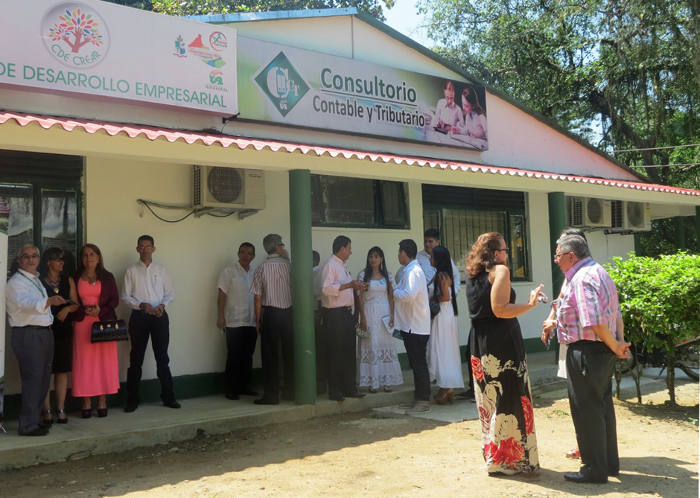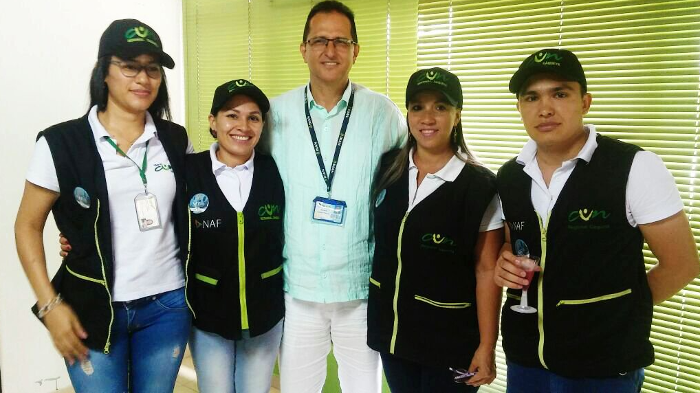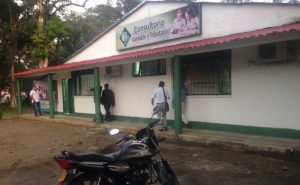-
|
05 April 2018
|Posteado en : Opinion
In the last stage of the journey with EUROsociAL+, we head to San Vicente del Caguán to attend the inauguration of the NAF
The municipality of San Vicente del Caguán has been particularly affected by armed conflict. Its inhabitants are trying to free themselves from the stigma of living in a ‘land of guerrillas’. The town was at the heart of the El Caguán demilitarised zone—–where the army would not enter–—during the Andrés Pastrana administration, something which allowed FARC to consolidate is influence in the region.
We are now heading there to inaugurate an NAF. The three-hour journey from Florencia passes through idyllic landscapes peppered with military roadblocks. Stories of armed conflict are inevitable: “presidential candidate Ingrid Betancourt was kidnapped making this same journey, three days after Pastrana broke off contacts with the FARC”, “the parliamentarian Diego Turbay was killed here a few minutes before arriving at the town of Puerto Rico”.
A car crosses our path, a strange manoeuvre which puts us on our guard. The suspicious vehicle has changed lanes to access a farm. False alarm. These are new times, but past fears have not abated. There are still FARC splinter groups who have not abandoned their weapons.
Taxes for development
The NAF is located in a citizen coexistence centre which offers services to vulnerable people: a family commissioner, police inspection, coordinating council meetings, a victim assistance unit, and so on. The mayor of San Vicente del Caguán, who opposes the peace agreements, is currently in Europe to see the lessons learnt in Northern Ireland first-hand. A total of 53% of the population of Caquetá voted against the agreement, so reconciliation has a long and difficult road ahead.
We are met by Cecilia Collazos, the acting mayor and social development secretary. In her view, tax fraud is mainly due to a culture of avoiding paying taxes: “rather than difficulties understanding the tax system, what there is here is a culture of non-payment and hiding real income in order to avoid taxes. The peace agreements have brought some changes, but there is still extortion, there are still splinter guerilla groups in the area. Real peace is achieved through projects, investment and employment”.
For Cristián, who studies accounting, the NAFs are very useful for his future career: “the accounting component focuses mainly on taxation, and the NAFs give us the chance to offer guidance to people with low incomes and so they can then be competitive in a market like San Vicente del Caguán, where there are a lot of businesses and lots of accountants are needed”. For Cristián, it’s obvious that development and taxation go hand in hand: “if we want social investment, we need to contribute by paying taxes. It will be difficult and we will encounter a lot of opposition at the start, but we will gradually provide a good service for the well-being of communities”.
The creation of the NAF is met with satisfaction from the business sector in San Vicente. This is the message we get from César Augusto España, coordinator of the Business Services Centre at the Chamber of Commerce of Caquetá: “We are three hours from Florence, where the DIAN (Colombian National Taxes and Customs Directorate) has its offices, and the NAF will expedite the process of fiscal formalisation in all municipalities”. España argues that “there is resistance to paying taxes due to limited access to public services and the scarce presence of the State. A full 98 per cent of companies in Caquetá are micro-enterprises and tax revenues are low, but the peace agreements are starting to stimulate the economy: in 2017, these companies grew by 34%”.
Light at the end of the tunnel
Despite the many obstacles, Hernando Vásquez, District Director for the DIAN, is optimistic about the new state of affairs: “I have been to almost 80 per cent of municipalities and I have encountered more receptivity. The public are asking us to assist and guide them in voluntarily meeting their tax obligations”.
Long-lasting peace and economic development are what the inhabitants of Caquetá most long for. A fertile, hospitable land with enormous potential for rural tourism and agricultural development, with a real desire to show that its fate is not sealed and that things can be different. It is now up to them to take the necessary steps to regain security and social cohesion.
It is also up to the institutions, who must forge a new relationship between the State and citizens based on reciprocity, a process in which civic-tax education will be enormously useful as a communication channel between the two.
Citizens and institutions both know that if they wait for the other side to do something, the vicious cycle of ‘not paying taxes-scarce public services-mistrust of the State’ could go on forever. To find a way out of the labyrinth of the post-conflict, it is necessary to move forward decisively with our sights set on a better future.
Borja Díaz Rivillas, Senior Expert in Democratic Governance for the EUROsociAL+ Programme
Read the first two parts:
Taxation, the state and the public in the labyrinth of the post-conflict (I)
Taxation, the state and the public in the labyrinth of the post-conflict (II)
-
|
15 March 2018
|Posteado en : Opinion
Education is a key factor in transforming the tax culture in those regions most seriously affected by the armed conflict. We continue our journey with EUROsociAL+ in Caquetá (Colombia)
The National Taxes and Customs Directorate (DIAN) in Caquetá knows that coercion will not get it anywhere, what it needs to do is convince. With only ten auditors, there is no way it can be breathing down every taxpayer’s neck. It needs to build bridges. It needs carrots as well as sticks.
The tax incentives created to promote formalisation and investment must therefore be accompanied by better tax information and assistance for citizens, as well as a good dose of education on the social purpose of taxes and public spending. Teaching children about taxes from an early age can make this process sustainable, and over the long-term, contribute to voluntary compliance with tax obligations.
For several years, the DIAN has been promoting meetings with children and young people on tax culture in schools in Caquetá and it holds tax services events to raise awareness of its role and get closer to the public. New opportunities are arising to consolidate and multiply these efforts through universities in the form of the Tax Assistance Hub project (NAF in its Spanish acronym).
University as a bridge between the DIAN and citizens
Last November, EUROsociAL+ – the European Union’s regional cooperation programme with Latin America – organised a workshop at the University of the Amazon in Florence dedicated to promoting post-conflict tax culture strategies. It was attended by tertiary education institutions and DIAN sections from the Areas Most Affected by the Armed Conflict in Colombia (Zomac).
The University of the Amazon is a unique institution. It is the only public university in Caquetá. It is strongly committed to the peace process, the environment and sustainable development.
Its Public Accounting Programme has joined the post-conflict challenge by creating a Tax Assistance Hub (NAF), an information point where university students give free tax and accounting advice to people with low incomes and micro entrepreneurs.

NAF at the University of the Amazon Trained by the tax administration, the students dedicate as much time as necessary to citizens, listening to their problems and concerns. They generate trust and help them understand the tax system and improve their small businesses.
NAFs are a bridge between the DIAN and the public. This experiment, devised in Brazil, is now present in more than 450 universities in 10 countries. In Colombia, 43 universities have joined, 20 of them in ZOMAC areas.
In the past 4 years, EUROsociAL has been supporting the expansion of this initiative by sharing experiences. The workshop in Florencia gave the opportunity to share lessons learned that can be applied to the post-conflict.
Young people as drivers of change
Hernando Vásquez, District Director with the DIAN sees the NAFs as a way for young people to transform the current situation: “The NAFs are an opportunity to generate trust in the tax administration and create civic awareness about taxes. What better way to give future accountants, administrators and lawyers a real view of what is happening?”.
The students attend campus every day and also visit business in Florencia and the surrounding municipalities. This allows them to see the reality of the post-conflict and the opportunities that peace brings for the development of the region.

Hernando with students from the NAFs One of the NAF students tells us about their experience: “Caquetá was badly affected by the armed conflict. We now have the opportunity to get to places that were inaccessible until now, and make Colombians from other regions and foreigners see that Caquetá wants to give the best of itself. Paying taxes means contributing to ourselves”.
And the student continues: “Business owners had the excuse that they shouldn’t pay taxes due to the armed conflict. But those excuses are no longer valid. We have gone to NAFs in some of the most difficult places such as San Vicente del Caguán or Cartagena del Chairá, where people are preparing for the law to be enforced more stringently. We need to show what taxes are used for and for farmers or businesspeople to see that taxes build roads to make their work easier”.
This reality is not alien to that of other areas affected by armed conflict, areas that share their experiences at the workshop. Natalia is another of the young people working in the NAFs in ZOMAC areas, in this case in Ibagué: “It’s really rewarding to help someone in need, someone who doesn’t know how to read or write, let alone use a computer, and for them to go away happy with their new knowledge“.
Borja Díaz Rivillas, Senior Expert in Democratic Governance for the EUROsociAL+ Programme
-
|
22 February 2018
|Posteado en : Opinion
We travel to Caquetá (Colombia) with the EU-funded EUROsociAL+ programme. In this first instalment, we find out about the tax culture in one of the territories that has existed for decades on the margins of the state, engulfed in the armed conflict
Our twin-engine plane touches down in Florencia, capital of Caquetá Department, the gateway to the Colombian Amazon. The storm which preceded our arrival has left the evening bright and clean. The sun melts onto the strikingly beautiful emerald green landscape. Zebu cattle surrounded by white herons, meandering rivers, rice, plantain and cassava plantations, farmers finishing off their working day… A haven of peace and harmony in a land stricken by armed conflict, drug trafficking and poverty.
Caquetá, land of informality
Caquetá lives primarily from livestock and agricultural production. Its 480,000 inhabitants are distributed among 16 municipalities, although the majority of caqueteños live in Florencia, a young city, founded in 1902.
Life in Florencia takes place in the shadow of the underground economy. According to figures by the Bank of the Republic of Colombia, 76 per cent of the working population are informal workers. The weak presence of the State, low quality public services and corruption are fed by deep-rooted practices among citizens, such as tax fraud, violence and a failure to respect public property. The city’s social problems have been accentuated by a massive influx of people displaced by the armed conflict, who account for 60% of the population.

Guayas river “Why pay if they steal it, what is the State giving us? I pay taxes while others thrive by not paying them. It’s not fair”, complain business owners. “There are rich livestock owners who don’t fulfil their tax obligations out of pure selfishness, this way, public services are never going to improve”, one public official told us.
Caquetá Department, just like other areas of the Colombian post-conflict, is caught in a vicious circle that complicates the social contract and the construction of a new framework for coexistence. The reciprocity between the State and citizens and trust between individuals is complicated.
The difficult task of collecting taxes
Being a public official in Caquetá is a challenge, but being a tax collector there deserves a medal. Someone who is only too aware of this is Hernando Vásquez. Hernando came up through the ranks to become the District Director of the Colombian Directorate of National Taxes and Customs (DIAN) in Caquetá: “Many years ago, when I first began working in the tax administration, I was the only auditor in the whole of Caquetá and I noticed real resistance from business owners and taxpayers. I conducted censuses and at times, I feared for my life, I almost had to run away”.
One result of the absence of the State in much of the region was that in many places, people paid a ‘vaccine’, a tax that citizens were made to pay by FARC (Revolutionary Armed Forces of Colombia). Business owners were forced to keep two sets of books in order to pay the extortion, keep their business, and most importantly, keep their family safe. Extortion by paramilitaries was also common.
Sometimes, business owners used armed groups to avoid paying taxes to the State. Hernando tells us that the inhabitants of one town told FARC about the presence of DIAN auditors. Faced with an incursion by guerilla fighters, the public officials had to leave the town in order to save their lives
Carrots and sticks
Although times have changed since the peace agreements between the Government and the armed groups, collecting taxes in this region of Colombia is still complicated, and paying them is not a priority civic duty in the minds of most caqueteños.
The State and DIAN are viewed with suspicion. There is a general lack of awareness about taxation. Many people are forced to work in the underground economy. Those that are aware of their obligations and have the financial means do not pay due to a lack of solidarity. Criminal gangs that benefited from contraband and extortion are still a threat for traders and business owners and of course, DIAN officials.
For taxes to be key in building peace and a more equal society with better public services, it is essential to transform the tax culture of the population and cause a paradigm shift in the relationship between the tax collector and the public.
Álvaro Pacheco, the Governor of Caquetá, is conscious of the need for more reciprocity: “As public awareness increases, so does tax revenue, and we see this reflected in projects that our country really needs, meaning we can advance forwards Paying taxes is nothing to be afraid of”.

One of the tax advice centres The DIAN in Caquetá knows that coercion will not get it anywhere, what it needs to do is convince. With only ten auditors, there is no way it can be breathing down every taxpayer’s neck. It needs to build bridges. As well as sticks, it needs carrots.
The tax incentives created to promote formalisation and investment must therefore be accompanied by better tax information and assistance for citizens, as well as a good dose of education on the social purpose of taxes and public spending. Teaching children about taxes from an early age can make this process sustainable, and in the long-term contribute to voluntary compliance with tax obligations.
For several years, DIAN has been promoting meetings with children and young people about tax culture in schools in Caquetá, and it holds tax services events to raise awareness of its role and get closer to the public. New opportunities are arising to consolidate and multiply these efforts through universities in the form of the Tax Assistance Hub project (NAF in its Spanish acronym).
Borja Díaz Rivillas, Senior Expert in Democratic Governance for the EUROsociAL+ Programme.






